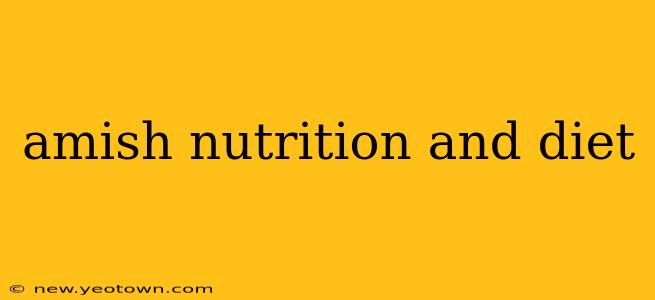The Amish, known for their simple and traditional way of life, often intrigue outsiders with their seemingly timeless approach to food and nutrition. Their diet, largely dictated by their religious beliefs and agrarian lifestyle, isn't just about sustenance; it's deeply intertwined with community, faith, and a strong connection to the land. But what exactly do the Amish eat? And how healthy is their diet compared to modern eating habits? Let's delve into the fascinating world of Amish nutrition.
What is the typical Amish diet?
The cornerstone of the Amish diet is fresh, locally sourced food. Imagine a life where your meals are largely dictated by the seasons and the bounty of your garden and farm. This isn't a romanticized picture; it's their reality. Their plates are often filled with homegrown fruits, vegetables, and grains, forming the basis of a predominantly plant-based diet. Think hearty stews simmered for hours, using seasonal vegetables and meats raised on their own farms. Dairy products, particularly milk and cheese, feature prominently, often homemade and unprocessed.
Meat consumption is generally moderate, usually consisting of pork, chicken, and beef, often raised on their own farms, ensuring a higher quality and arguably more sustainable source of protein. They emphasize whole, unprocessed foods, largely avoiding the processed foods, sugary drinks, and fast food so prevalent in modern society. This inherent avoidance of processed foods translates to naturally lower sodium and sugar intake.
What are the health benefits of the Amish diet?
The Amish diet, with its emphasis on whole foods and limited processed ingredients, often reflects a healthier dietary pattern. This focus aligns with current nutritional guidelines advocating for increased fruit and vegetable consumption and reduced intake of processed foods, saturated fats, and added sugars. Studies, while limited, suggest that the Amish tend to have lower rates of obesity and certain chronic diseases compared to the broader population. However, it's crucial to remember that this isn't solely due to their diet. Factors like physical activity and strong community support also contribute significantly to their overall health.
Do Amish people eat fast food?
While exceptions always exist within any community, fast food is generally uncommon in Amish communities. Their lifestyle and values strongly emphasize home-cooked meals, fostering a strong connection to food preparation and family time. The absence of fast food in their daily lives directly contributes to their lower consumption of unhealthy fats, sugars, and preservatives commonly found in such foods.
What are some traditional Amish foods?
Amish cuisine boasts a rich collection of traditional dishes, many passed down through generations. Think savory pot roasts, hearty soups brimming with vegetables and meats, homemade breads, and delectable pies baked with locally sourced fruits. Their preserved foods, like jams, jellies, and pickled vegetables, highlight their resourcefulness and appreciation for seasonal ingredients. These traditions reflect a connection to the land and a deep-rooted appreciation for simple, flavorful food.
Are there any drawbacks to the Amish diet?
While largely healthy, the Amish diet might lack the diversity found in a more varied diet. The reliance on local produce limits the accessibility of certain fruits and vegetables, particularly those out of season. Moreover, while their diet is generally lower in saturated fat, the consumption of higher amounts of animal products can still be a concern for individuals with specific health conditions. It’s also worth noting that this way of eating may not be easily adopted into modern lifestyles.
Conclusion: A Lesson in Simplicity
The Amish diet offers a compelling case study in the potential benefits of a simpler, more traditional approach to eating. Their emphasis on whole foods, home-cooked meals, and locally sourced ingredients offers valuable lessons for modern society, grappling with the challenges of processed foods and sedentary lifestyles. While it's not a prescriptive model for everyone, the Amish diet underscores the importance of mindful eating, community, and a deep connection to the source of our food.

